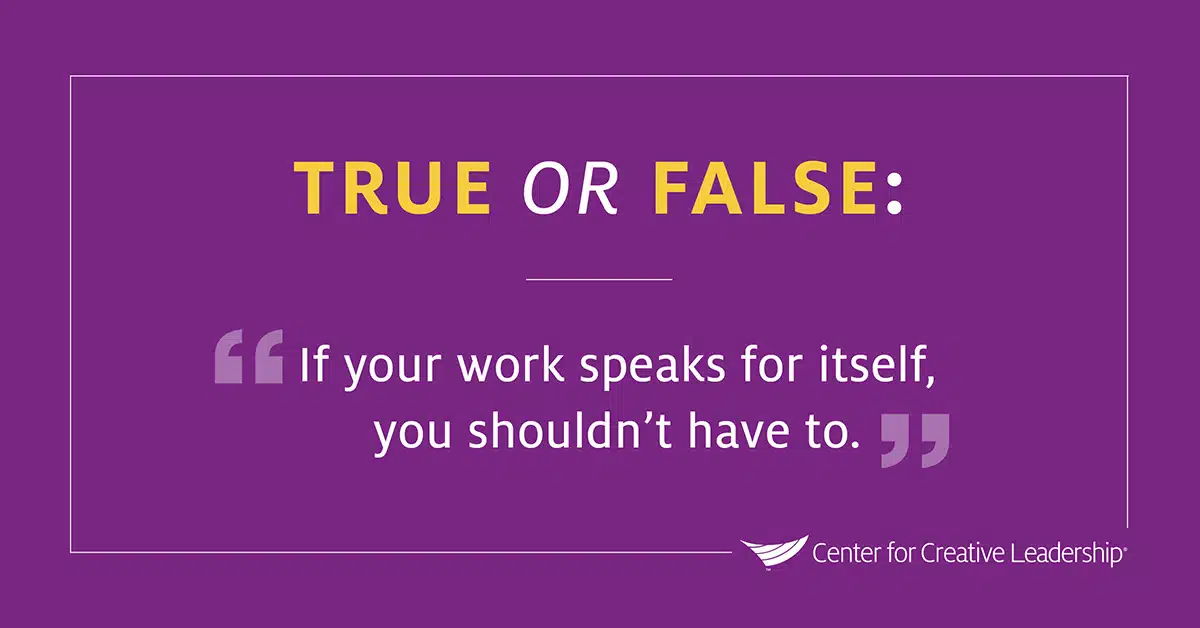Let’s start with a quick quiz: True or false: “If your work speaks for itself, you shouldn’t have to.”
Okay, you probably already guessed the answer is false. Even if you’re one of the most talented leaders in your company and your work is stellar, your skills and successes might go unnoticed and some authentic, strategic self-promotion might be in order.
Not everyone is comfortable with self-promotion at work. Many capable and talented leaders feel like self-promoting is bragging or “sucking up.” Like having political skill, being self-promotional at work is often viewed in a negative light.
But actually, when self-promotion is done well — matching style with substance — it’s usually interpreted as effective communication, managing up, networking, information-sharing, or relationship-building — all of which are very positive and respected skills for a leader to have.
Why Self-Promotion at Work Is Important
3 Reasons Authentic Self-Promotion Matters
Given the current uncertainty in the world and the move to a more hybrid workforce, self-promotion at work is even more important today than in years past. Here’s why:
1. Talent doesn’t equal recognition.
People are busy, organizations are dispersed, priorities are shifting, and technology is changing how we work. Many high-performing individuals and groups can be overlooked with everything else that’s going on.
2. Success requires many relationships.
The boss can’t know everything, and facetime is limited. Keeping only your boss informed only goes so far. Many people across the team and organization need to know who you are and what you have to offer.
3. Lean organizations need to employ and keep the best performers.
People need to be in roles where they are most efficient and effective. Long gone are the days when “just doing your job” translated to success. Everyone is doing more with less, now more than ever. In times of layoffs, it’s dangerous to rely on the leadership to make the best decisions about people’s worth to the organization. The most visible, but not necessarily most valuable, employees are often the ones who make the cut.
Using Visibility to Benefit You, Your Team, and Your Organization
If you often feel you’re being overlooked, underestimated, or not recognized at work, yet also are uncomfortable with the concept and practice of self-promotion, reframe any old beliefs you hold about visibility, according to Selling Yourself Without Selling Out: A Leader’s Guide to Ethical Self-Promotion.
Many leaders fall victim to some common limiting beliefs that prevent them from achieving a truly stellar personal leadership brand.
5 Self-Limiting Beliefs About Self-Promotion at Work That You’ll Want to Avoid
Avoid falling for these 5 common self-limiting beliefs, and learn how to turn them around to appropriately self-promote at work.
Limiting Belief #1: “Accomplishments should speak for themselves.”
The truth is, a lot of good work falls under the radar. Often people believe they shouldn’t have to self-promote because good work will speak for itself. But many managers are surprised to find that bosses, peers, and direct reports don’t recognize their skills and contributions. It’s your job to let people know about your work, why it’s important, and how it benefits others.
Limiting Belief #2: “My boss is too busy to hear me talk about myself.”
Isn’t it part of your boss’s job to know what’s happening in the department? By keeping them informed, by providing the information they need, you are, in fact, doing your job. Your very busy boss doesn’t want to pry things out of you: Tell them what’s going well, where you might be struggling, and what you need to succeed. Remember, being able to talk about your own accomplishments and the support you need is an important part of convincing your boss to invest in your development.
Limiting Belief #3: “Team players don’t take credit.”
Actually, high visibility benefits the team. You need to be skilled at communicating the value of the work and the talent of the people on the team. At times, your efforts may highlight your individual role; in other cases, you may promote another team member or the team as a whole. This type of promotion generates rewards and recognition for a deserving team.
Limiting Belief #4: “I don’t want to brag.”
Shift your mental model: View talking about your accomplishments as a way to help others who might be working on similar projects or task forces. Sell yourself as a resource. Think of it as walking into the spotlight rather than trying to shine it on yourself.
Limiting Belief #5: “I’m just not comfortable promoting myself.”
For a variety of reasons, some people are incredibly uncomfortable speaking up about their accomplishments. For leaders who naturally shy away from self-promotion, or who struggle to overcome impostor syndrome, the key is to use tactics and behaviors that are effective and, at the same time, will maintain a sense of integrity and authenticity.
Self-promotion is a key component of a leader’s effectiveness and long-term success. To develop strong, effective self-promotional skills, leaders need to find a balance between over-the-top, obnoxious bragging and being overly modest — and overlooked.

Figure out the leader you want to be — and how to build the brand that can get you there — with proven strategies and practical advice from CCL experts.
How to Get Noticed — in a Good Way
Our Tips for Authentic Self-Promotion at Work
If you’re convinced that now is a good time to do some authentic self-promotion around your work, here are some good tips to try:
- Self-promotion doesn’t have to be painful or over-the-top. People who promote well understand the importance of publicizing the work done by themselves and their groups, and there are many ways to do it: speak up in meetings, be clear about successes, improve communication with your boss and peers, volunteer for visible roles. Don’t be obnoxious, but don’t be overlooked, either.
- Effective self-promotion isn’t about being someone you’re not. In fact, your efforts will be more accurate and better received if you’re genuine and even imperfect. Authentic leadership is important for a healthy and collaborative workplace. Without it, credibility is strained and trust is hard to come by. So be real, be yourself.
- Get clear on your strengths and why they matter. If you try to self-promote and are off the mark, then you come across as either pathetic or having delusions of grandeur. Understanding and knowing who you are is key to boosting your self-awareness.
- Deliver what you promote. Back up your claims with real accomplishments, skills, experience, or knowledge that deserve recognition and acknowledgment. If you tout yourself as detail-oriented, then crunch the numbers, plan the minutiae, and uncover the mistakes. Have unmatched people skills? Put them to use resolving conflict, coaching others, and building a great group.
- Be honest and open. Self-promotion isn’t about stating false or exaggerated information. It’s about being genuine and frank about your work and your efforts.
- Acknowledge the positive. In your routine discussions and meetings, be sure to talk about successes. Avoid focusing only on struggles or frustrations.
- Don’t totally ignore trouble spots. Be realistic about challenges and problem areas. Otherwise, your credibility will suffer.
- Learn to summarize your successes. People are too busy to listen to all the details about what you do. Keep it high level.
- Be proactive. Ask for assignments, and don’t wait for someone to hand you good opportunities to shine.
- Don’t block information. The more you release information instead of hoarding it, the more powerful it — and you — will become.
- Reach out. Invite people from other areas of the business to sit in on a meeting to give a fresh perspective. Ask a more seasoned or senior person for their insight or opinion. Then you’ll have a good reason to keep that person informed of the result.
- Tout the team. Showcasing the accomplishments of your team is one of the most comfortable ways to gain visibility, to extend your network, and to build relationships. Recognize the team’s role in your successes and give praise and credit to specific individuals for good work.
- Be careful that you don’t inflate yourself at others’ expense. What might seem like a win at the time can damage your reputation and limit your ability to work well with others. Plus, it’s just not nice. (And if you’re a boss, then don’t let yourself be duped by shameless self-promotion.)
- Step into the spotlight. Take on challenging work assignments and high-visibility projects. Seek opportunities to interact with senior management in situations that showcase your strengths. Don’t expect others to notice your work without your efforts. Doing a job and doing it well doesn’t ensure that others will appreciate and value it. Some self-promotion at work is necessary to connect the dots between what you do and why it matters.
The decision-makers in your organization won’t always make those connections by themselves. You can and should “toot your own horn” in a way that is authentic, honest, and good for both your career and your organization.
By following these recommendations, you’ll not only reap benefits for yourself, but for your team and organization as well.
Ready to Take the Next Step?
If you’re a leader who struggles with authentic self-promotion at work, then explore our fundamental leadership skills program, Lead 4 Success® , to help you strengthen your personal leadership brand by improving your self-awareness, communication, influence, and learning agility.
Or, upskill your entire team with a customized learning journey for your leaders using our research-backed modules. Available leadership topics include Authentic Leadership, Communication, Influence & Selling Your Ideas, Self-Awareness, and more.











